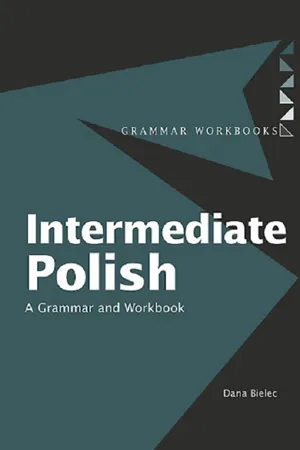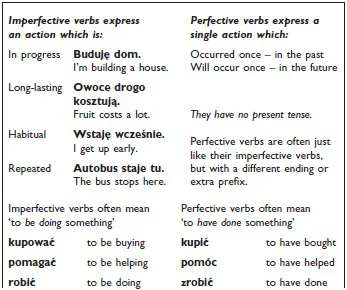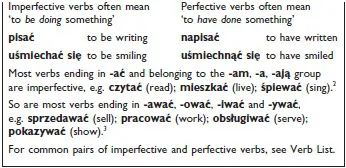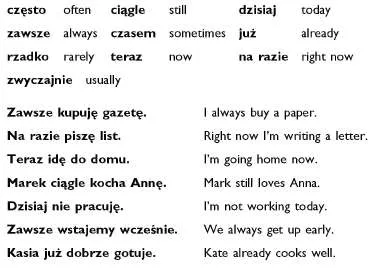
- 240 pages
- English
- ePUB (mobile friendly)
- Available on iOS & Android
About this book
Intermediate Polish is designed for learners who have achieved basic proficiency and wish to progress to more complex language. Each unit combines clear, concise grammar explanations with examples and exercises to help build confidence and fluency.
Features include:
* focus on areas of particular confusion such as verbs that are difficult to translate and nouns made from numbers
* comprehensive glossary of grammatical terms
* reference list of over 250 Polish verbs
* full key to all exercises.
Suitable for independent learners and students on taught courses, Intermediate Polish, together with its sister volume, Basic Polish, forms a structured course in the essentials of Polish.
Dana Bielec is the author of the popular Polish: An Essential Grammar, as well as Basic Polish: A Grammar and Workbook, both published by Routledge.
Tools to learn more effectively

Saving Books

Keyword Search

Annotating Text

Listen to it instead
Information
Unit 1
Verb aspects


Verbs with two imperfective forms
How perfective verb forms are made


Tenses in imperfective and perfective verbs
- Present (I buy, I do buy, I am buying)
- Past Continuous, much like the Imperfect Tense in some languages (I was buying when . . ., I used to buy, I would normally buy)
- Composite Future, made with być (to be) (I will be buying from now on...)
- Conditional Continuous (I would be buying if... )
- Past Simple (I bought, I did buy) which also translates the English Present Perfect (I have bought)
- Simple Future, made without być (to be) (I will buy)
- Conditional (I would buy if ... )
Adverbs to clarify meaning in imperfective verbs

Exercise 1
Notes
Table of contents
- Cover
- Half Title
- Full Title
- Copyright
- Dedication
- Contents
- Introduction
- Abbreviations
- 1 Verb aspects
- 2 -ać and -ić verbs: present tense consonant change
- 3 Comparisons: adjectives in -er and -est
- 4 Present tense of -nąć verbs
- 5 Short-stem non-wać verbs: padding with ’j‚ (present)
- 6 Comparisons: adverbs with ’more‚ and ’most‚
- 7 Past tense of most imperfective verbs; movable person suffixes
- 8 Past tense of imperfective verbs in -eć and -noć
- 9 Past tense of doubleimperfective verbs
- 10 Short-stem verbs in -ść and-ć (present, past)
- 11 Modal verbs musieć,chcieć, woleć (present,past); because, since
- 12 Past tense of perfectiveverbs (prefixed);when(ever), as soon as
- 13 Past tense of perfectiveverbs (stem-changed)
- 14 ’Can‚:móc, potrafić,umieć (present, past)
- 15 Past tense of perfectiveverbs in -ąć and -nąć
- 16 Unusual verb pairs; politecommands with Proszę
- 17 Higher numbers and dates
- 18 Future with być – imperfective verbs; time expressions
- 19 Future without być – perfective verbs; gdy, jak
- 20 Informal commands
- 21 Commands with niech; -ś and -kolwiek; vocative case
- 22 Verbs from iść (past, future)
- 23 Verbs from iść andchodzić (commands);concessions
- 24 Modal verbs powinienemand mieć (present, past)
- 25 How verbal prefixes change meaning; direction to/from
- 26 Six very precise verbs
- 27 Simple conditions and wishes; jeśli/jeueli, może
- 28 Conditions with ’I would . . .if ‚; avoiding ambiguity
- 29 Modal verbs (future,conditional); źeby; else
- 30 Impersonal verbs (present);cause and result
- 31 Impersonal verbs (past, future, conditional)
- 32 Się to translate ’one‚ and ’you‚
- 33 Impersonal widać, słychać, czuć, znać
- 34 Present adverbial participle in -ąc (while . . . -ing)
- 35 Past adverbial participlein -wszy and -łszy(having . . . )
- 36 Indefinite numbers; -ka nouns from numbers
- 37 Relative pronoun który; adjectives used as nouns
- 38 Present adjectival participle (active) — imperfective verbs
- 39 Present adjectival participles (passive) — imperfective verbs
- 40 Past adjectival participle (passive) — perfective verbs; until, while, before
- Appendix 1 Prepositions and their cases
- Appendix 2 Adjective endings
- Appendix 3 Declension of pronouns
- Appendix 4 Future of stem-changed perfective verbs
- Key to exercises
- Glossary of grammatical terms
- Polish–English verb list
- Index
Frequently asked questions
- Essential is ideal for learners and professionals who enjoy exploring a wide range of subjects. Access the Essential Library with 800,000+ trusted titles and best-sellers across business, personal growth, and the humanities. Includes unlimited reading time and Standard Read Aloud voice.
- Complete: Perfect for advanced learners and researchers needing full, unrestricted access. Unlock 1.4M+ books across hundreds of subjects, including academic and specialized titles. The Complete Plan also includes advanced features like Premium Read Aloud and Research Assistant.
Please note we cannot support devices running on iOS 13 and Android 7 or earlier. Learn more about using the app